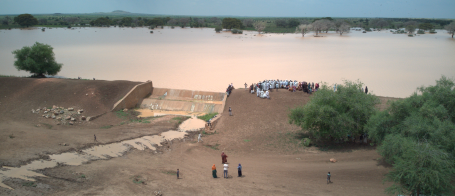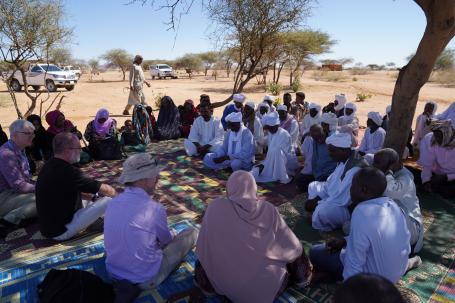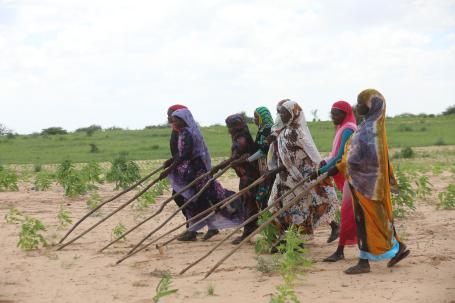Improving agricultural productivity and fostering peace through inclusive natural resource management in Sudan

The UNEP-led Wadi El Ku 2 catchment project used inclusive natural resource management strategies to improve agricultural productivity and foster local peace across 22 village councils, impacting 100,000 people in Sudan. By using the Weathering Risk methodology to evaluate the project, critical success factors, like relationship building and locally owned multi-scalar governance structures, were identified for climate security and peacebuilding initiatives.
Conflict, climate change and intensifying resource competition are creating an unprecedented humanitarian crisis in Sudan
North Darfur, in western Sudan, has endured conflict since 2003, causing widespread destruction, displacement and breakdown of social cohesion. Traditional resource management systems have collapsed alongside government services. Women face disproportionate burdens and violence risks as well as increased workloads. At the same time, climate change brings higher temperatures and erratic rainfall, triggering frequent and prolonged droughts. These environmental shifts devastate agriculture and pastoralism, intensifying resource competition between ethnic groups, pastoralists and farmers. After the April 2023 conflict between the Sudanese Armed Forces (SAF) and the Rapid Support Forces (RSF), over half of Sudan's population—30.4 million people—now rely on humanitarian assistance, as North Darfur continues to experience armed confrontations.
The Wadi El Ku (WEK 2) catchment management project tackles the intertwined conflict and climate change challenges
The project (2018-2024) in North Darfur, was led by UNEP, in collaboration with the Sudanese government in North Darfur and Practical Action in the Wadi El Ku area, a seasonal river covering 28,000 km². The project stretches more than 90% (180 km) of the catchment area, including communities along this region, where rainfall has declined by half over the last decade. WEK 2 elaborated on its previous phase, which addressed a 50 km stretch, and expanded to reach 100,000 beneficiaries, including farmers and pastoralists, across 22 village councils and seven Damaras. It employed inclusive natural resource management strategies, including water catchment infrastructures, to improve agricultural productivity and foster local peace.

Consultation with community leaders in the new project area of WEK2 in 2019
Use of the Weathering Risk methodology
UNEP worked with adelphi research to use the Weathering Risk methodology for evaluating the WEK 2 project. This approach captured good practices, challenges and lessons learned. It also analysed climate-conflict dynamics and intervention impacts and identified critical success factors for climate security and environmental peacebuilding initiatives in conflict and post-conflict zones.
The methodology combined a comprehensive review of 45 documents, including reports, reviews and technical materials, to track the project's evolution and strategic framework alongside video documentation that captured first-hand testimonials from women's groups and farmers' associations.
During Sudan’s escalating conflict, the flexibility of the WR methodology enabled remote stakeholder engagement when on-ground missions became impossible after April 2023. Interviews with government officials, project implementers and community representatives shed light on how civilians actively protected water catchment infrastructure, even as RSF forces advanced into North Darfur. Despite eventual displacement, the project maintains vital community connections.
Key learnings
Integrating conflict sensitivity from the start was vital. The project used inclusive participatory mapping and integrated water resource management during a longer inception phase thanks to flexible donor funding.
It's not what we do, but how we do it.
-Project officer, UNEP Sudan
By generating essential water resource data and ensuring active involvement and ownership from diverse stakeholders, such as government officials, IDPs, pastoral communities and farmers, the project significantly enhanced technical and policy-level permanent natural resource management structures, addressing water catchment and delineation of migratory routes.
Discussions that focused on shared interests concerning water access proved to be less political and helped reduce tensions. Efforts like holding community festivities, engaging upstream and downstream traditional leaders and communities-built trust, created communication channels and established water and peace committees to resolve resource conflicts by peaceful means.

Women farmers in Edelbida village, North Darfur, Sudan
The project bolstered water catchment capacity alongside climate-resilient agricultural practices and improved livelihoods. It empowered women by facilitating access to capital through savings and loans groups. This initiative equipped women with skills to start and manage small businesses, fostering collaboration between women pastoralist and farmers, breaking down communication barriers and enhancing economic activity and social cohesion.
The way forward
WEK 2 shows how peacebuilding and stabilisation in Sudan should include decentralised governance for managing water, land, mineral, and biodiversity resources in a changing climate, led by local authorities and community governance structures. The Wadi El Ku project exemplifies how adaptive and multi-scalar local governance can manage vital resources like water and land and foster local peace through effective resource management.
This impact story was prepared by Héctor Camilo Morales Muñoz and Alexandra Steinkraus (adelphi research).
Share on

